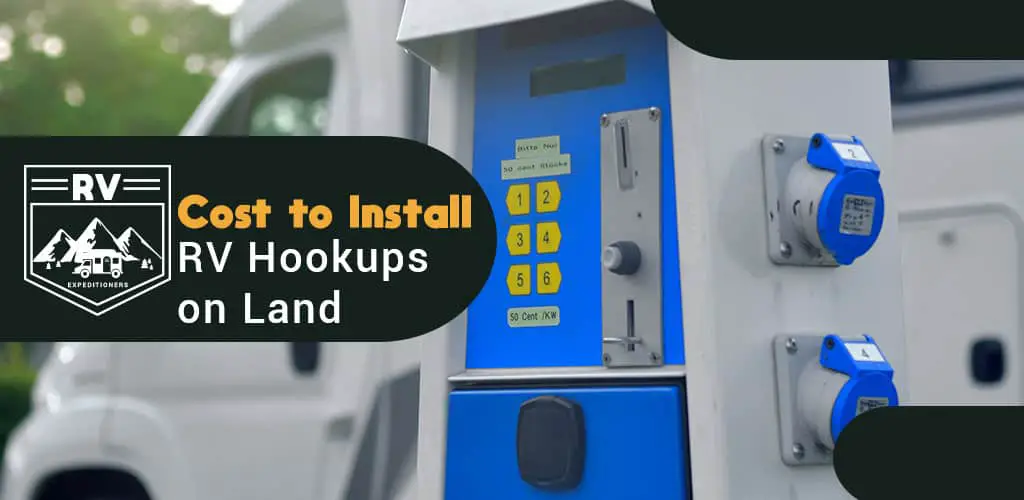RVs are made for you to enjoy the open road, but what about the rest of the year? What will it take to hook up an RV at home? We will cover the installation process for RV hookups and the costs involved with such projects.
The numbers we use here are to give you an estimate of what to expect. Prices will vary depending on where you buy supplies, who you hire and how much work you want to do yourself. Be savvy, check work references and get a few quotes as you shop around.
How Much Does it Cost to Install RV Hookups?
The short answer is, “It depends.” The costs can vary wildly depending on which hookup you want and your RV specs such as how many amps it requires. They also depend on how much DIY you plan to do, what local professionals charge, the distance from your house and what sewer system you have.
Let’s take a quick look at the individual hookups.
- Cost to Install a Water Hookup - $30 DIY; $700 for a professional.
- Cost to Install an Electric Hookup - About $1,200 for a professional (amateur DIY not recommended).
- Cost to Install a Sewer Hookup - highly variable.
- free or amazingly cheap when using an existing sewage system
- $2,000-3,000 to install an RV septic tank
The cost varies based on the nature of your project and your willingness to tap into your inner engineer.
Why Do You Need to Install RV Hookups?
Your RV gives you the freedom to take the comfort and familiarity of home wherever the road takes you. But when you’re not on the move, that RV can have other uses. Imagine setting up your house guests in their own mini domicile, equipped with a TV, unlimited running water, and perfect temperature control.
You could even set it up as an office or as a home base as you on a plot of land you are developing into a second home. All of these mini fantasies have a common theme - hookups.
How Much Does it Cost to Install RV Hookups?
Let’s look at some of the costs in a little more detail and cover some of the finer points/steps.
Build a Gravel Parking Pad
Cost: $300-$2,000
You’ll need an even surface that will not buckle under the weight of an RV or sink into the ground when wet. Pick a spot that will not drop all sorts of debris on your RV and perhaps not so far from your home to cut costs.
Gravel pads and cement or work perfectly for this. Gravel pads are the best if you want to DIY and are relatively inexpensive at $1-3 per square foot. Other factors include excavation cost, gravel type, and soil condition.
Install Some Wooden Posts
Cost: ~$50 per post (and digging)
Dig an 8”X30” hole for a 4”X4” post and concrete. This post holds your electric and water hookups, so position it next to the driver’s side. Consider doing some weatherproofing to protect the post from the elements.
Set Up the Water Line
Cost: ~$100 DIY or +$500 hiring professionals
Dig a trench deep enough (below the frost line) so the high-rated CPVC pipe isn’t going to freeze and burst in the winter. Connect and secure the pipe to the water supply and wrap exposed pipe sections to protect them from the cold.
MUST
Contact utility companies (gas, electric, and water) before breaking ground to avoid accidentally breaking anything already buried. Avoid injury and possible death with just a few phone calls.
Install the Electricity
Cost: ~$1,200 to hire a professional
Unless you are an electrician, we strongly recommend that you spend the money to get one to do the job right. Be the savvy consumer and check references to make sure you get the best person for your budget.
Place the Sewer System
Cost: <$100 connecting to the cleanout port or septic tank; $2,000-3,000 for the septic tank
Some can just hook the RV up to the cleanout to the public sewer system. Long distances to cleanouts require some help in the form of a long hose and a macerator pump to grind the solid waste and move it along. Check to see if it’s legal to just hook up to the cleanout in the first place.
You might have a septic tank you could simply hook into, but in-ground tanks will require a good deal of professional work to bury the tank. Maintenance will include hiring workers to empty the tank.
Parting Thoughts
Remember that these prices are here to give you an estimate, so do your research on the parts you buy and the professionals you hire. A little bit of keyboard work and some phone calls could save you a lot of money and greatly improve your hookups.
Visit us again soon for more RV content!

